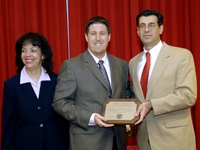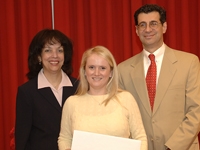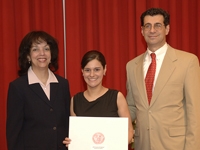
Barry Jay Kappel (center), the 2006 Distinguished Student Speaker of the Graduate School, is presented with a special plaque by Francoise Freyre, assistant dean of the Graduate School, and Dr. David Hajjar, dean of the Graduate School.
On May 17, Weill Graduate School of Medical Sciences of Cornell University presented five awards to 26 graduates and students during the school's Convocation ceremonies, the largest in the school's history.
"Our growth has been spectacular, and as a result, our awards have also increased," Dr. David Hajjar, dean of the Graduate School, said. "Life is not all about awards, but we recognize students for the superb job they have done."
This year the Graduate School conferred 12 Masters of Science degrees and 39 Doctorates of Philosophy. Collectively the class has published more than 60 papers in scientific journals.

Dr. Emilio Emini is presented with the Graduate School's Alumni Award of Distinction by Dr. Francesca Domenech Wuttke, president of the Graduate School Alumni Association.
"Our goal is for our students to perform at the highest levels of scholarship and this class exemplifies that paradigm," said Dr. Joel Pardee, associate dean of the Graduate School.
During the ceremony, Dean Hajjar introduced the class's Commencement speaker, Barry Jay Kappel, calling his work at Weill Cornell "nothing short of remarkable," with significant clinical contributions in immunology.
Kappel's work has resulted in eight published manuscripts and 15 research papers. During his time at Weill Cornell, Kappel twice won the du Vigneaud Award for research and in 2001 was honored with a Howard Hughes Medical Institute Predoctoral Fellowship, the first such award in the Graduate School's history.
The ceremony also featured Dr. Emilio Emini, a 1980 graduate of the Graduate School, was honored with the Alumni Award of Distinction. Dr. Emini is considered one of the world's foremost researchers in the field of infectious disease and AIDS vaccination, and his career includes work for pharmaceutical companies Merck and Wyeth, and the International AIDS Vaccine Initiative.

Gaorav Gupta receives the prestigious Julian Rachele Prize for his study "Genes that Mediate Breast Cancer Metastasis to Lung," published in Nature.
"You all stand at a time when you cannot imagine where you'll be in 10 years, but I can tell you that it will be an exciting journey because it's an exciting time for science," said Dr. Emini. "The world continues to fundamentally change, and you are going to drive a lot of that change."
During the awards ceremony, Drs. Hajjar and Pardee presented seven Vincent du Vigneaud Prizes, 11 Vincent du Vigneaud Awards of Excellence and three Vincent du Vigneaud First-Year Awards. Also awarded were four Julian Rachele Prizes, the highest recognition awarded to Graduate School students, for publishing groundbreaking research in a leading scientific journal.
2006 JULIAN RACHELE PRIZES
Gaorav P. Gupta, (Professor Joan Massagué) Graduate Program in Cell Biology and Genetics. "Genes that Mediate Breast Cancer Metastasis to Lung." Nature, 2005
Kiersten A. Henderson, (Professor Scott Keeney) Graduate Program in Molecular Biology. "Cyclin-Dependent Kinase Directly Regulates Initiation of Meiotic Recombination." Cell, 2006
Vishwanath Jogini, (Professor Benoit Roux) Graduate Program in Physiology, Biophysics, and Systems Biology. "Electrostatics of the Intracellular Vestibule of K+ Channels." J. Mol. Biol., 2005
Karen Y. Wu, (Professor Samie Jaffrey) Graduate Program in Pharmacology. "Local Translation of RhoA Regulates Growth Cone Collapse." Nature, 2005
2006 STUDENT SERVICE AWARD
Omar Vandal
2006 VINCENT du VIGNEAUD PRIZES

Andrea Hooper, a recipient of a du Vigneaud Prize.
Andrea Hooper, "Deployment of IGFBP-7 to Matrix Regulates Vascular/Angiogenic Patterning in Zebra Fish." (Professor Shahin Rafii)
Muris Kobaslija, "Manipulating Properties of Macromolecules Through Cross-Linking: Applications in Coatings and Catalysis." (Professor D. Tyler McQuade, Cornell University, Ithaca, NY)
Ram Madabhushi, "Actin Homologue MRE B Affects Chromosome Segregation by Regulating TOPO IV in E.coli." (Professor Kenneth J. Marians)
Justin S. Potuzak, "Stereocontrolled Synthesis of Spiroketals Using Novel Kinetic Cyclization Reactions." (Professor Derek S. Tan)
Omar Vandal, "Acid Resistance Mechanisms in Mycobacterium Tuberculosis." (Professor Sabine Ehrt and Professor Carl Nathan)
Ali A. Yunus, "Structural and Functional Analysis of E2-Mediated Conjugation in the Sumo Pathway." (Professor Christopher D. Lima)
Piraye Yurttas, "Elucidation of the Role of PADI6 and the Oocyte Cytoplasmic Lattices in Early Embryonic Development." (Professor Scott Coonrod)
2006 VINCENT du VIGNEAUD AWARDS OF EXCELLENCE
Andrea Brenner Anantharam, "Urinary Tract Segmentation is Dependent on BMP Signaling." (Professor Doris Herzlinger)
Jeanne Farrell, "Investigation of the Molecular Identity of Soluble Adenylyl Cyclase." (Professor Jochen Buck and Professor Lonny Levin)
Cristina Fernandez, "Elucidation of the Function of the Truncated HOXA1 Protein." (Professor Lorraine J. Gudas)
Sheetal Gandotra, "Protein Degradation in Pathogenic Mycobacteria: A Means to Resist Host Defenses?" (Professor Sabube Ehrt)
Ann M. Gregus, "Knockout of the GLUR5 Subunit of Kainate Receptors Reveals Its Role in Morphine Tolerance and Nociception." (Professor Charles E. Inturrisi)
Joseph D. Mancias, "Mechanisms for Cargo Exit from the Endoplasmic Reticulum: Crystal Structure of the SEC23/24-SEC22 Complex." (Professor Jonathan Goldberg)

Cristina Fernandez, a recipient of a du Vigneaud Award of Excellence.
Jayakrishnan Nandakumar, "Stepwise Analysis of the RNA Ligase Mechanism Using Enzymology and Structural Biology." (Professor Stewart Shuman and Professor Christopher D. Lima)
Dan Su, "Ectopic Expression of Human Lecithin: Retinol Acyltransferase in Mouse Suprabasal Epithelial Cells Results in Resistance to Topical All-Trans Retinol Induced Epidermal Hyperplasia." (Professor Lorraine J. Gudas)
Rajeshwari R. Valiathan, "Expression of HIV-1 GAG Attenuates Ligand-Induced Downregulation of EGFR and CXCR4." (Professor Marilyn D. Resh)
Guocan Wang, "Phosphorylation-Dependent Regulation of SCF Complex Formation and SKP2 Function by AKT/PKB." (Professor Paul Tempst and Professor Pier Paolo Pandolfi)
Carl P. Wonders, "Generation of Different Cortical Interneuron Subgroups from Subregions of the Basal Telencephalon." (Professor Stewart A. Anderson)
2006 VINCENT du VIGNEAUD FIRST-YEAR AWARDS
Eleanor Allen, "Using Split-Pool Library Screen to Find New Nitric Oxide Donors." (Professor Samie Jaffrey)
Taya Feldman, "Nucleotide Hydrolysis and Caspase Activation by APAF-1." (Professor Xuejun Jiang)
Karl A. Merrick, "Defining the Roles of the CDK7 During the Cell Cycle with Chemical Genetics." (Professor Robert P. Fisher)

